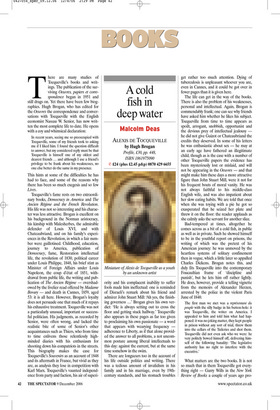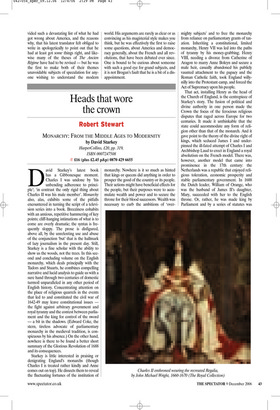A cold fish in deep water
Malcolm Deas
ALEXIS DE TOCQUEVILLE by Hugh Brogan Profile, £30, pp. 448, ISBN 1861975090 ✆ £24 (plus £2.45 p&p) 0870 429 6655 There are many studies of Tocqueville’s books and writings. The publication of the surviving Oeuvres, papiers et correspondence began in 1951 and still drags on. Yet there have been few biographies. Hugh Brogan, who has edited for the Oeuvres the correspondence and conver sations with Tocqueville with the English economist Nassau W. Senior, has now written the most complete life to date. He opens with a coy and whimsical declaration:
In recent years, seeing me so preoccupied with Tocqueville, some of my friends took to asking me if I liked him. I found the question difficult to answer, but my considered reply must be that Tocqueville is himself one of my oldest and dearest friends ... and although I use a friend’s privilege to be frank about his weaknesses, no one else better do the same in my presence.
This hints at some of the difficulties he has had to face, and some of the reasons why there has been so much exegesis and so few Lives.
Tocqueville’s fame rests on two extraordinary books, Democracy in America and The Ancien Régime and the French Revolution.
His life was not so interesting and his character was less attractive. Brogan is excellent on his background in the Norman aristocracy, his kinship with Malesherbes, the admirable defender of Louis XVI, and with Chateaubriand, and on his family’s experiences in the Revolution, in which a fair num ber were guillotined. Childhood, education, journey to America, publication of Democracy, fame, Restoration intellectual life, the revolution of 1830, political career under Louis Philippe, 1848, his brief stint as Minister of Foreign Affairs under Louis Napoleon, the coup d’état of 1851, with drawal from public life, the writing and publication of The Ancien Régime — overshad owed by the livelier read offered by Madame Bovary — and death in Cannes, 1859, aged 53: it is all here. However, Brogan’s loyalty does not persuade one that much of it repays his exhaustive treatment. Tocqueville was not a particularly unusual, important or success ful politician. His judgments, as recorded by Senior, were often wrong, and lacked the realistic bite of some of Senior’s other acquaintances such as Thiers, who from time to time enlivens those relentlessly highminded diaries with his enthusiasm for shooting down his compatriots in the streets.
This biography makes the case for Tocqueville’s Souvenirs as an account of 1848 and its aftermath in France, but vivid as they are, as analysis they lose in competition with Karl Marx. Tocqueville’s vaunted independ ence from party and faction, his air of superi ority and his complacent inability to suffer fools made him ineffectual: one is reminded of Disraeli’s remark about his friend and admirer John Stuart Mill: ‘Ah yes, the finishing governess ...’ Brogan gives his own verdict: ‘He is always setting out to cross the floor and getting stuck halfway.’ Tocqueville also appears in these pages as far too given to proclaiming his own passionate — a word that appears with wearying frequency adherence to Liberty, as if that alone provided the answer to all problems, a not uncommon posture among liberal intellectuals to this day: against the current, but at the same time somehow in the swim.
There are longueurs too in the account of his life outside politics and writing. There was a tedious amount of invalidism in his family and in his marriage, even by 19thcentury standards, and his stomach troubles get rather too much attention. Dying of tuberculosis is unpleasant whoever you are, even in Cannes, and it could be got over in fewer pages than it is given here.
The life can get in the way of the books. There is also the problem of his weaknesses, personal and intellectual. Again, Brogan is commendably frank; one can see why friends have asked him whether he likes his subject. Tocqueville from time to time appears as spoilt, arrogant, snobbish, opportunist and the devious prey of intellectual jealousy he did not give Guizot or Chateaubriand the credits they deserved. In some of his letters he was enthusiastic about sex — he may at an early age have fathered an illegitimate child, though as is the case with a number of other Tocqueville papers the evidence has been mysteriously lost or mislaid, and will not be appearing in the Oeuvres — and that might make him these days a more attractive figure than John Stuart Mill, were it not for his frequent bouts of moral vanity. He was not always faithful to his middle-class English wife, and was also impatient about her slow eating habits. We are told that once when she was toying with a pie he got so exasperated that he seized her plate and threw it on the floor: the reader applauds as she calmly asks the servant for another slice.
Bad-tempered at times, altogether he comes across as a bit of a cold fish, in public as well as in private. Such he showed himself to be in the youthful report on prisons, the writing of which was the pretext of his American journey: he was unmoved by the heartless systems of solitary confinement then in vogue, which a little later so appalled Charles Dickens. Brogan notes this, and duly fits Tocqueville into the contemporary Foucaultian frame of ‘discipline and punish’, but he lets him off rather lightly. He does, however, provide a telling vignette from the memoirs of Alexander Herzen, arrested by the police in the violent Paris June of 1848: The first man we met was a représentant du peuple with the silly badge in his button-hole: it was Tocqueville, the writer on America. I appealed to him and told him what had happened: it was no joking matter, they kept people in prison without any sort of trial, threw them into the cellars of the Tuileries and shot them. Tocqueville did not even ask who we were: he very politely bowed himself off, delivering himself of the following banality: ‘The legislative authority has no right to interfere with the executive.’ What matters are the two books. It is not so much that in them Tocqueville got everything right — Garry Wills in the New York Review of Books a couple of years ago pro vided such a devastating list of what he had got wrong about America, and the reasons why, that his latest translator felt obliged to write in apologetically to point out that he had at least got some things right, and likewise many of the theses of The Ancien Régime have had to be revised — but he was the first to make both of their themes unavoidable subjects of speculation for anyone wishing to understand the modern world. His arguments are rarely as clear or as convincing as his magisterial style makes you think, but he was effectively the first to raise some questions, about America and democracy generally, about the French and all revolutions, that have been debated ever since. One is bound to be curious about someone with such a good eye for grand subjects, and it is not Brogan’s fault that he is a bit of a disappointment.



























































































 Previous page
Previous page